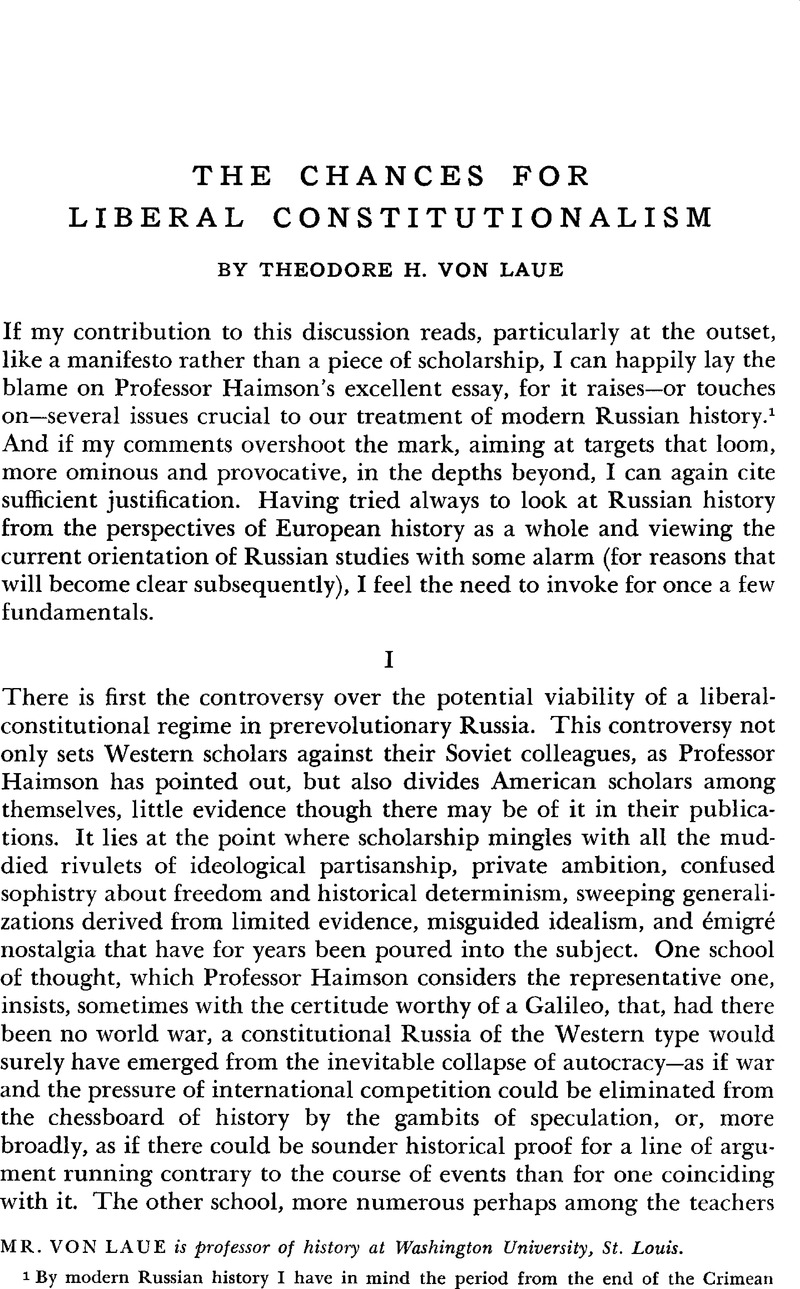Article contents
The Chances for Liberal Constitutionalism
Published online by Cambridge University Press: 27 January 2017
Abstract

- Type
- Discussion
- Information
- Copyright
- Copyright © Association for Slavic, East European, and Eurasian Studies. 1965
References
1 By modern Russian history I have in mind the period from the end of the Crimean
2 My analysis, J trust, is sufficiently elementary to bypass any consideration of the epistemological problems raised by the term “reality.” Here as in the subsequent pages I have taken my clue from Aristotle's Ethics: “It is the mark of an educated mind to seek only so much exactness in each type of inquiry as may be allowed by the nature of the subject matter” (the latter being limited by the editor to a maximum of fifteen typewritten pages).
3 Most existing American studies of Russian history, unfortunately, would seem to fall I into the same category as those studies in the history of ideas characterized by R. G. Collingwood as follows: “If the historian working against the grain of his mind … tries i to master the history of thought into which he cannot personally enter, instead of writing J history, he will merely repeat the statements that record the external facts of its develop- J ment.” The Idea of History (Oxford, 1946), p. 305.
4 The discussion of “Russia and the West” in a previous number of this periodical does i not, in my opinion, penetrate to the heart of the matter.
5 In this respect the evidence adduced in Fischer, Fritz, Griff nach der Weltmacht (Düsseldorf, 1962)Google Scholar, is conclusive.
6 See, for instance, V. V.'s plea of early 1906: “We want to eat, dress, entertain ourselves, and construct our homes, streets, or urban buildings on the model of what is being done in these areas by modern Europe…. Our war with Japan has shown with painful clarity to what dangers our nation is subject if it fails to adopt not only modern military techniques, but western culture in general.” And this from a narodnik! See Mendel, A. P., Dilemmas of Progress in Tsarist Russia (Cambridge, Mass., 1961), p. 59.CrossRefGoogle Scholar
7 It is one of the particular handicaps in the study of Russian history that so many Russians, particularly among the intelligentsia, thoughtlessly took over Western concepts ill-suited to Russian realities. The wholesome organic unity of words and reality prevalent in English and American usage is largely lacking in Russian historical and political writing. For that reason, too, the study of the sources left by the Russian intelligentsia, a group deeply alienated from Russian reality, is apt to yield rather limited insight into Russian conditions.
8 Chernov, V. M., The Great Russian Revolution (New Haven, 1936), p. 140.Google Scholar
9 Ibid., p. 435; italics my own.
10 Miliukov, Paul, Russia and Its Crisis (New York: Collier Books, 1962), p. 26 Google Scholar. The phrase was originally coined by E. B. Lanin (E. J. Dillon), in Russian Characteristics.
11 I suspect that B. Veselovsky's four-volume ![]() (St. Petersburg, 1909-11) gives too favorable a picture of zemstvo activity.
(St. Petersburg, 1909-11) gives too favorable a picture of zemstvo activity.
12 “Russian Labor between Fields and Factory,” in California Slavic Studies, III (Berkeley, 1964); and “Russian Peasants in the Factory,” Journal of Economic History, XXI, No. 1.
13 Chernov, pp. 58-59.
14 I have ventured a radical reinterpretation of modern Russian history based on these considerations in an essay Why Lenin? Why Stalin? (Philadelphia and New York, 1964.
- 3
- Cited by


